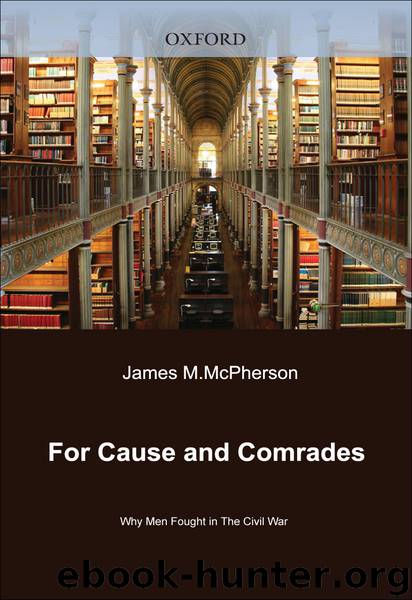For Cause and Comrades by James M. McPherson

Author:James M. McPherson
Language: eng
Format: epub
Publisher: Oxford University Press
Published: 1997-02-14T16:00:00+00:00
CHAPTER 9
SLAVERY MUST BE CLEANED OUT
A YEAR BEFORE LEE surrendered at Appomattox, a Texas private predicted that Confederate victory was certain because “we are fighting for our property and homes; they for the flimsy and abstract idea that a negro is equal to an Anglo American.”1 He was wrong in more ways than one. Few Union soldiers professed to fight for racial equality For that matter, not many claimed even to fight primarily for the abolition of slavery. In his study of Billy Yank, Bell Wiley wrote that scarcely one in ten Union soldiers “had any real interest in emancipation per se.” If by “per se” Wiley meant “in and of itself alone,” one in ten may be an exaggeration. Rare indeed were two soldiers, one from Wisconsin and the other from Maine, whose letters home contained such sentiments as: “I have no heart in this war if the slaves cannot go free.” Our cause is “nobler even than the Revolution for they fought for their own freedom, while we fight for that of another race. . . . If the doom of slavery is not sealed by the war I shall curse the day I entered the Army or lifted a finger in the preservation of the Union.”2
But if “emancipation per se” meant a perception that the abolition of slavery was inseparably linked to the goal of preserving the Union, then three in ten Union soldiers whose letters and diaries form the basis of this book took that position during the first eighteen months of the war, and many more were eventually converted to it. While restoration of the Union was the main goal for which they fought, they became convinced that this goal was unattainable without striking against slavery. “I believe that Slavery (the worst of all curses) was the sole cause of this Rebellion,” wrote a private in the 5th Iowa in January 1862, “and untill this cause is removed and slavery abolished, the rebellion will continue to exist.” A corporal in the 64th Ohio likened secession to a cancer. “We are now fighting to destroy the cause of these dangerous diseases, which is slavery and the slave power.” A private in the 1st Minnesota put the point succinctly: “The war will never end until we end slavery.”3
Experience in the South reinforced the antislavery sentiments of many soldiers. After talking with a slave woman in Virginia who described the brutal whipping of her husband, a private in the 83rd Pennsylvania wrote to a cousin in January 1862: “I thought I hated slavery as much as possible before I came here, but here, where I can see some of its workings, I am more than ever convinced of the cruelty and inhumanity of the system.” A sergeant in the 90th New York stationed on the South Atlantic coast in 1862 likewise vented his wrath at “this cursed slavery that gives one man power over another to whip or to do as he pleases with him.”4
Several soldiers wrote home after a few months in the South that slavery was a “blight” that “withered all it touched.
Download
This site does not store any files on its server. We only index and link to content provided by other sites. Please contact the content providers to delete copyright contents if any and email us, we'll remove relevant links or contents immediately.
| Afghan & Iraq Wars | American Civil War |
| American Revolution | Vietnam War |
| World War I | World War II |
Waking Up in Heaven: A True Story of Brokenness, Heaven, and Life Again by McVea Crystal & Tresniowski Alex(37808)
Empire of the Sikhs by Patwant Singh(23084)
We're Going to Need More Wine by Gabrielle Union(19046)
Hans Sturm: A Soldier's Odyssey on the Eastern Front by Gordon Williamson(18590)
Leonardo da Vinci by Walter Isaacson(13336)
The Radium Girls by Kate Moore(12028)
Tools of Titans by Timothy Ferriss(8393)
Educated by Tara Westover(8054)
How to Be a Bawse: A Guide to Conquering Life by Lilly Singh(7486)
Permanent Record by Edward Snowden(5846)
The Last Black Unicorn by Tiffany Haddish(5635)
The Rise and Fall of Senator Joe McCarthy by James Cross Giblin(5280)
Promise Me, Dad by Joe Biden(5153)
The Wind in My Hair by Masih Alinejad(5095)
A Higher Loyalty: Truth, Lies, and Leadership by James Comey(4960)
The Crown by Robert Lacey(4814)
The Iron Duke by The Iron Duke(4354)
Joan of Arc by Mary Gordon(4109)
Stalin by Stephen Kotkin(3965)
